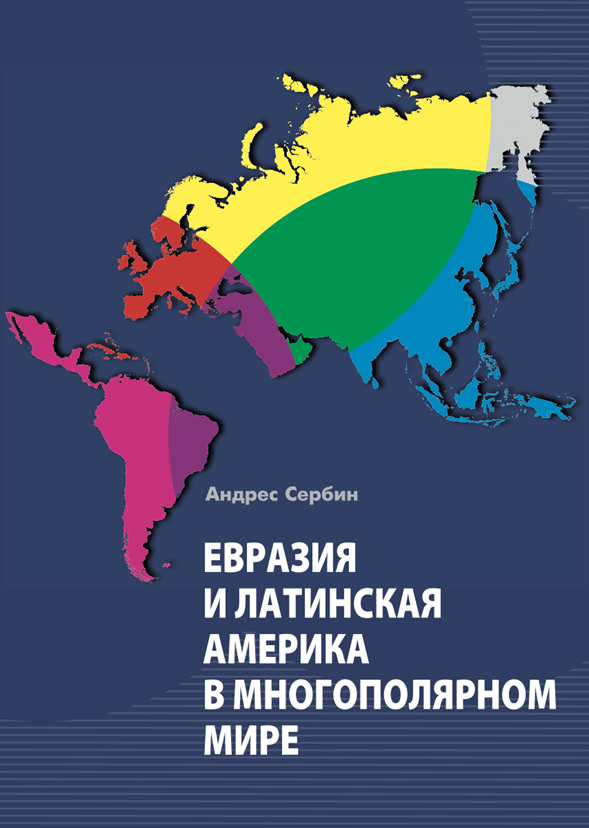Author: Juan Martin González Cabañas – 06/05/2021

In one of his latest works “América Latina y Eurasia en un mundo multipolar” (Eurasia and Latin America in a multipolar world) the experienced scholar, researcher and international analyst Andrés Serbin (*) performs a relevant analysis on the present transformations of the international system, especially those that imply the emergence of new dynamics in the mega-Eurasian region and its repercussions for Latin America.
The book is now available in Russian language: Евразия и Латинская Америка в многополярном мире.Its translation into Russian language has been carried out by the LACRUS (**) project team, platform led by PhD Oxana Katysheva.
The book is structured around a series of chapters that approach some topics such as:
- The transformations and tectonic changes that imply geo-economic and geopolitical reconfigurations at the global level: as the gravitational shift of the world economy towards the regions of Asia and the Pacific, the emergence of a much more multipolar configuration, in which the rise of a Eurasian geopolitical dynamic in contrast with the traditional Atlantic and Western pole stands out.
- The emergence of new relevant actors such as China, Russia, and India added to others considered as middle powers (such as Iran, Turkey) that generate new economic, institutional dynamics, as well as their consequent geopolitical (regional and global) narratives.
- The current complex geopolitical dynamics, where the interests of various actors, with different capacities and strategies, intersect within the framework of a mega continental space – such as the Eurasian space.
- The complex institutional framework in the Eurasian space that is articulated between the Shanghai Cooperation Organization (SCO), the Eurasian Economic Union, and the initiative of the New Belt and Silk Road (BRI) where a gravitational pole is being formed as a counterweight to the western and Atlantic world.
- The analysis (and review) of the past and present concept of Eurasia and Eurasian ideas.
- Prospects for a strategic convergence between Russia and China around the concept of Greater Eurasia.
- The possibilities of Eurasia – Latin America relations.
This book and its translation into the Russian language imply a milestone in the academic exchange between Russia and Latin America. This also implies the deployment of another channel of Eurasia-Latin America inter-regional dialogue that promotes understanding and mutual opportunities.
(*) Andrés Serbin is president of the CRIES centre (Centro Coordinadora Regional de Investigaciones Económicas y Sociales – Regional Coordination Centre for Economic and Social Research).The CRIES centre, founded in 1982 in Managua (Nicaragua), is a network of research centres, non-governmental organizations, professional associations and foundations, that promote economic, political and social research in Latin America and the Caribbean. Since 2016 it has become a regional think tank.
(**) LACRUS is an international digital platform (available in English, Spanish and Russian languages) specialized in the dissemination of relevant, enlightening and reliable information about Latin American countries and their socio-political, economic, cultural and humanitarian relations with Russia.
Book Review by Juan Martin González Cabañas
Other articles by Juan Martin González Cabañas published in Vision & Global Trends. International Institute for Global Analyses’ website:
- Public perception of the Sputnik V vaccine in Argentina and Latin America
- Vaccination: Market Commodity or Public Good?
- Vision & Global Trends presence at Latin American conference
- The world order after the US elections
- SAOCOM 1B: Italy and Argentina partners in outer space
- The slow decline of Catholicism in Latin America
- Latin America – Russia: An Agenda for Constructive Cooperation in the Post-COVID-19 Era
- Synthesis and analysis of the IEES Panorama of geopolitical trends Horizon 2040
- International Relations: a Critical Theory from the South American periphery
- Argentina in the Multipolar Order
- The War for the Web
- Old roads and new paradigms: on the last BRI Summit
- The second return of Marco Polo to Italy
- Huawei case: high tech war, strategic competition, geopolitical tension
- The South American and Venezuelan Uncertain Horizon
